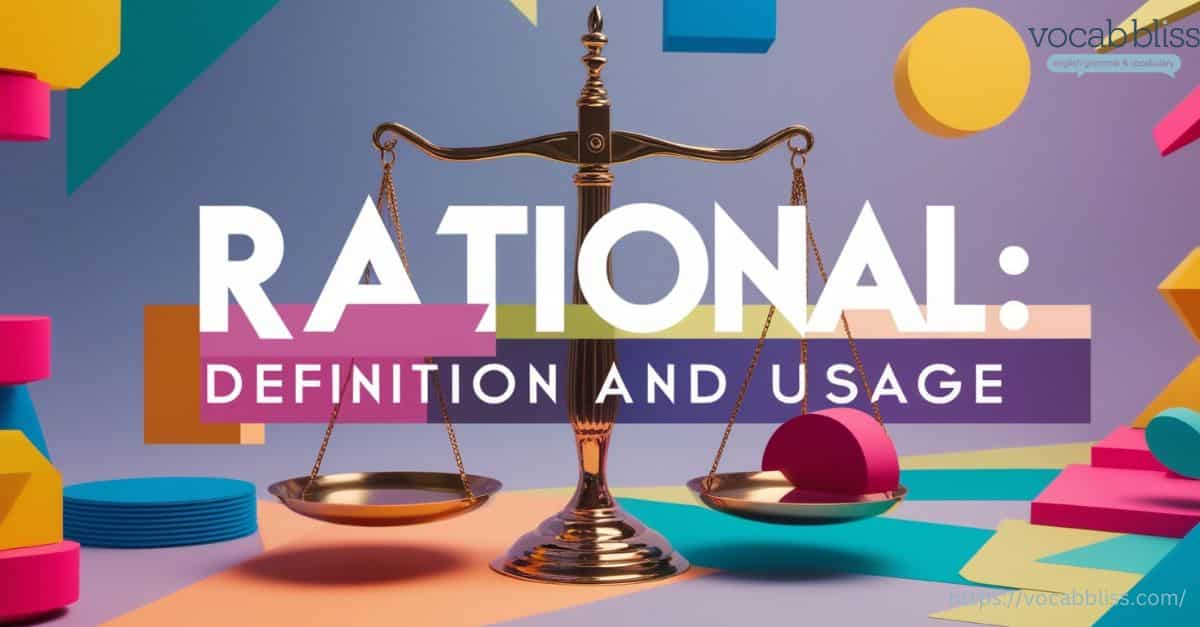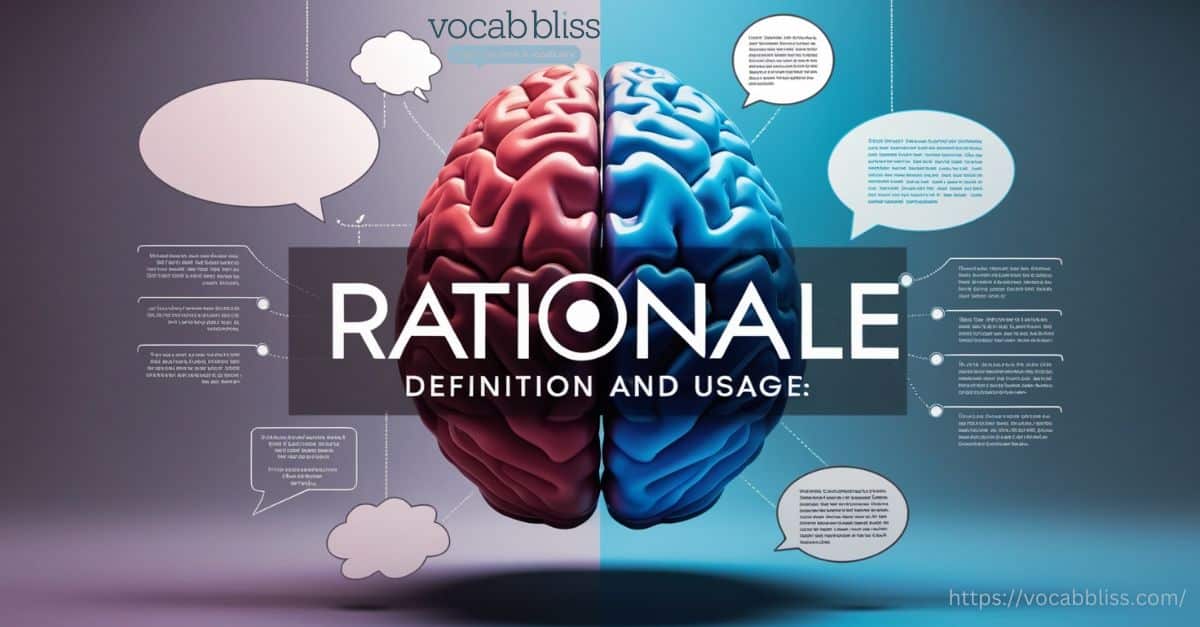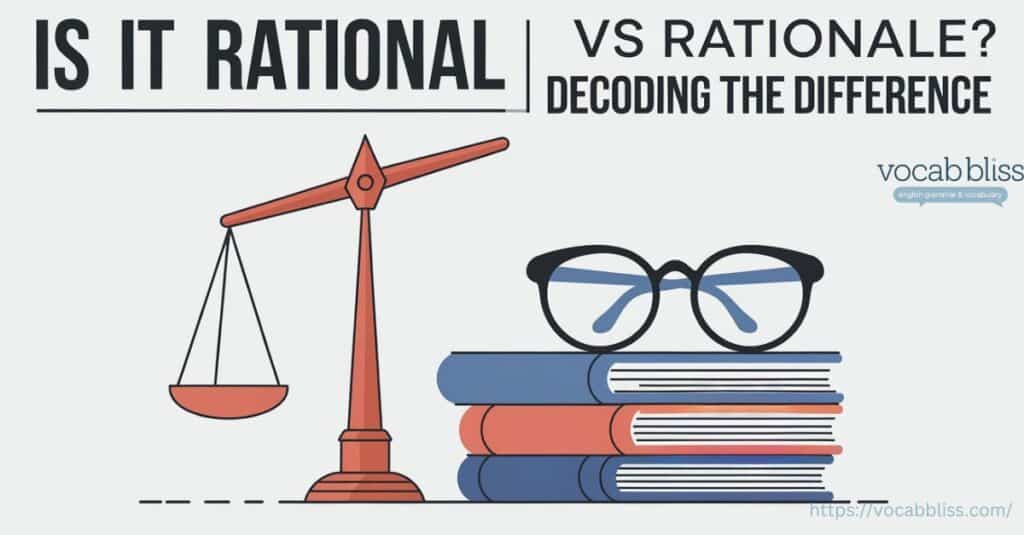Have you ever paused while writing and wondered whether to use “rational vs rationale”? These two terms sound similar, but their meanings and applications differ significantly. Using them incorrectly can confuse readers or miscommunicate your intent. In this article, we’ll unravel the difference between rational and rationale, explore their usage, and offer tips to ensure you never mix them up again.
Quick Summary
In summary, “rational vs rationale“ are closely related but serve distinct purposes in language. “Rational” is an adjective describing logical thinking or sound judgment, while “rationale” is a noun referring to the reasoning or justification behind an action or idea. Both words share a common Latin root, emphasizing their connection to reason and logic. By understanding their differences, pronunciation, and usage, you can communicate with precision and confidence. Use “rational” to describe logical behavior and “rationale” to explain the reasons behind decisions. This clarity ensures effective and professional communication in any context.
Discover more: Inbetween or In Between? Which Is Correct?
Understanding “Rational or Rationale”
Before diving into their differences, it’s essential to understand what “rational vs rationale” mean. Both terms are rooted in logic and reasoning, but they serve distinct purposes in language.
Rational: Definition and Usage

Definition:
The word “rational” is an adjective that refers to logical or reasoned thinking. It describes thoughts, actions, or decisions based on facts, logic, and sound judgment rather than emotions or impulses.
Usage in Sentences:
- “Her rational explanation helped everyone understand the complex problem.”
- “It’s not rational to make decisions based on hearsay instead of evidence.”
- “He remained rational even in a highly emotional situation, which calmed everyone around him.”
These examples show how “rational” emphasizes a logical approach to situations, emphasizing critical thinking and objectivity.
Synonyms: Logical, reasonable, analytical, coherent, sound
Antonyms: Irrational, illogical, unreasonable, emotional
Contextual Insight:
Use “rational” to describe qualities or behaviors guided by logic. For example, “a rational argument” highlights a structured, fact-based reasoning process, while “an irrational fear” indicates something not grounded in logic.
Rationale: Definition and Usage

Definition:
Unlike “rational”, the word “rationale” is a noun that refers to the reasoning or justification behind an action, belief, or decision. It’s about explaining “why” something was done or thought.
Usage in Sentences:
- “The rationale for implementing the new policy was the need to increase efficiency.”
- “Before making a decision, he asked for the rationale behind the proposed changes.”
- “The rationale for her argument was grounded in years of research and data.”
These sentences demonstrate how “rationale” clarifies the reasoning or purpose behind choices or ideas.
Related Terms: Justification, explanation, basis, reasoning, foundation
Contextual Insight:
Think of “rationale” as the “why” behind an action. For instance, in a business meeting, you might hear, “Can you explain the rationale behind this strategy?” Here, the focus is on uncovering the logic or reasoning supporting the plan.
Key Distinction
While “rational” describes the quality of being logical, “rationale” identifies the justification or reasoning itself.
- Rational is about how someone thinks or acts.
- Rationale is about why something was done.
Difference Between Rational vs Rationale
While “rational vs rationale” share a linguistic connection, their meanings and applications differ significantly. Let’s break down their specific distinctions to make their usage crystal clear.
What Is Their Main Difference?
The primary difference between “rationale or rational“ lies in their function and usage:
- “Rational” is an adjective that describes logical thinking, sound judgment, or reasoned behavior. It focuses on how decisions or actions are made.
- “Rationale” is a noun that refers to the reasoning or justification behind an action or belief. It answers the question of why something was done.
Key Example:
- Rational: “Her rational decision to save money came from careful financial planning.”
- Rationale: “The rationale for saving money was to ensure financial security during uncertain times.”
Quick Mnemonic:
- Rational describes logical thinking (adjective).
- Rationale explains the reason behind an action (noun).
By keeping this distinction in mind, you can use these terms appropriately in any context.
Are They Interchangeable?
No, “rationale or rational“ are not interchangeable. Using one in place of the other can lead to confusion and miscommunication. Let’s explore why.
Differences in Function and Context
- Part of Speech:
- Rational is an adjective, so it modifies nouns (e.g., “a rational person”).
- Rationale is a noun, so it represents a concept or thing (e.g., “the rationale for her actions”).
- Meaning:
- Rational relates to logical thinking or actions.
- Rationale refers to the explanation or reasoning behind those actions.
Examples to Clarify:
- Incorrect: “The rational for his argument was compelling.”
- Correct: “The rationale for his argument was compelling.”
- Incorrect: “She provided a well-thought-out rationale solution.”
- Correct: “She provided a well-thought-out rational solution.”
Why They Can’t Be Swapped
Using “rational” instead of “rationale” (or vice versa) fundamentally changes the sentence’s meaning. For instance:
- “His rationale is flawed” critiques his reasoning.
- “His rational thinking is flawed” critiques how he thinks.
While related, “rationale or rational” serve different roles in language. Understanding these distinctions ensures precise and professional communication.
Side-by-Side Comparison rational vs rationale
For quick reference, here’s a table that clearly distinguishes “rational or rationale” based on their key characteristics:
| Aspect | Rational | Rationale |
|---|---|---|
| Part of Speech | Adjective | Noun |
| Meaning | Logical, reasonable | Reasoning or justification |
| Focus | Describes thinking or actions | Explains the “why” behind something |
| Usage Example | “She made a rational choice.” | “The rationale was well-explained.” |
| Related Terms | Logical, analytical, coherent | Justification, explanation, basis |
| Context | Decision-making, behavior | Arguments, reasoning, explanations |
How to Use This Table:
This side-by-side comparison serves as a quick and practical guide to determine which term to use in a given context. When describing logical behavior, opt for “rational”. When explaining the reasoning behind an action, choose “rationale”.
Pro Tip: Think of “rational” as a trait and “rationale” as the reasoning supporting that trait.
rational or rationale Everyday Usage Examples
Both “rational or rationale” frequently appear in professional and everyday contexts. Let’s explore examples to clarify their usage further:
Examples of Rational:
- A rational decision considers long-term consequences.
- The scientist provided a rational explanation for the phenomenon.

Examples of Rationale:
- The rationale for hiring additional staff was increased demand.
- He offered a solid rationale for his proposal during the debate.
Common Mistake to Avoid:
- Incorrect: “His rational for the decision was unclear.”
- Correct: “His rationale for the decision was unclear.”
Pronunciation of Rational or Rationale
Understanding how to pronounce “rational or rationale” correctly is key to using them confidently in speech. While they look similar, their pronunciations differ subtly.
Phonetic Spellings
| Word | Phonetic Spelling | Breakdown |
|---|---|---|
| Rational | [rash-uh-nl] | rash-uh-nuhl |
| Rationale | [rash-uh-nal] | rash-uh-naal |
Key Differences in Pronunciation
- “Rational” ends with a soft and short “-nl” sound, making it feel concise and straightforward.
- “Rationale” has a distinct “-nal” sound at the end, pronounced more fully like “naal.”
Tips for Proper Pronunciation
- Mnemonic for Rational:
- Think of the word “rational” as being “rationally short,” mirroring its clipped ending sound.
- Mnemonic for Rationale:
- To pronounce “rationale”, remember that the “e” at the end gives it an elongated sound, like finale.
- Stress Placement:
- “Rational”: Stress on the first syllable (RASH-uh-nl).
- “Rationale”: Stress on the last syllable (rash-uh-NAAL).
- Practice Sentences:
- “Her rational thinking saved the day.” (RASH-uh-nl)
- “The rationale for her actions was clear.” (rash-uh-NAAL)
Similarities Between rationale vs rational
While “rational or rationale” have distinct meanings and functions, they share notable similarities rooted in their connection to logic and reasoning.
Connection Through Logical Reasoning
Both terms stem from the concept of logic and reason:
- “Rational” describes logical thought or behavior.
- “Rationale” refers to the explanation or reasoning behind an action or decision.
This shared focus on reason and logic makes them closely related, often used in contexts where critical thinking or justification is involved. For example:
- “Her rational thinking was evident in the well-crafted rationale she provided.”
Here, the logical thinking (rational) directly informs the reasoning (rationale).
Etymology: Shared Origin in Latin

Both rationale vs rational trace back to the same Latin root, “ratio”, which means “reason” or “calculation.”
- “Rational”: Derived from the Latin word rationalis, rationale meaning “endowed with reason.”
- “Rationale”: Originates from rationalis as well, but evolved in usage to mean “an explanation or justification.”
Key Insight
Although they have different applications, “rationale vs rational” are linguistically and conceptually intertwined. Understanding their etymological connection helps clarify their relationship and reinforces their logical foundation in both language and thought.
When to Use Rational and When to Use Rationale
Here’s a simple guide:
- Use Rational When:
- Describing a logical decision or thought.
- Talking about actions based on reason rather than emotion.
- Example: “Taking a rational approach saves time.”
- Use Rationale When:
- Explaining the reasoning behind a choice.
- Providing a justification for an action.
- Example: “The rationale behind the rule is public safety.”
Trick to Remember the Difference
Confused? Here’s an easy mnemonic:
- Rational = Logical (both words end in “al”).
- Rationale = Reason (think of the “e” in both words).
Using this trick, you’ll always pick the right term!
Conclusion
Choosing between “rationale vs rational” may seem daunting, but with practice, it becomes second nature. Whether you’re crafting an email, drafting a report, or simply having a conversation, using the correct term ensures your message is clear and impactful.
Next time you encounter these words, pause and think: Are you describing logic (rational) or explaining reasoning (rationale)? That clarity will set you apart as a skilled communicator!
Continue reading:
- Pick Up or Pickup, Pick-Up: How Should It Be Used?
- Infact or In Fact: What’s Grammatically Correct?
- Tomorrow or Tommorrow: Which One Is Correct?
- Inter vs Intra: Decoding the Differences

Jorge Phillips is an experienced blogger who writes for Vocab Bliss, sharing his passion for the English language. With a knack for simplifying complex grammar rules and a focus on commonly confused words, Jorge helps readers navigate the nuances of English with ease. His insights aim to make learning engaging and practical.







